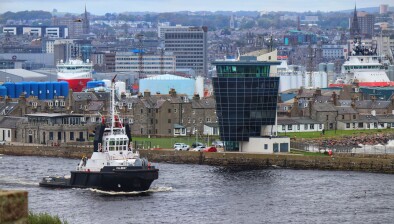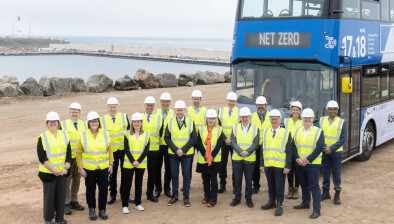Economy secretary Kate Forbes publishes new economic transformation strategy

A new National Strategy for Economic Transformation, underpinned by detailed analysis of Scotland’s economic strengths and weaknesses, has been published by the Scottish Government.
The strategy contains over 70 actions across five key priority programmes that have been identified as having the greatest potential to deliver economic growth that significantly outperforms the last decade within the current constitutional arrangements.
Investment will be prioritised in entrepreneurialism, skills and retraining and the development of new markets and opportunities, particularly in the Just Transition to net zero. Economy secretary Kate Forbes says it provides renewed clarity on Scotland’s economic vision and a relentless focus on delivery in order to improve economic productivity, accelerate growth and ensure work provides a genuine route out of poverty through better quality jobs and higher wages.
A sixth programme marks a step-change in the way the Scottish Government and business listen to, support and work with each other in this national endeavour to transform the economy.
Shaped by the Advisory Council and extensive engagement with stakeholders, this will enable government, business and key partners to work together to create a more prosperous, more productive and more internationally competitive economy.
The Economy Secretary launched the Strategy at the Michelin Scotland Innovation Parc in Dundee, a location which embodies the potential transformation that can be realised by bringing the six key programmes of action together.
Ms Forbes said: “This strategy intentionally focuses on five key priorities, within Scotland’s current powers, that we believe will deliver most impact. These are based on extensive data analysis which does not ignore the short or long term challenges and seeks to meet them head on. It does so by identifying our key strengths as a nation and the economic opportunities with the greatest potential for Scotland. Through our detailed analytical work we have identified significant and targeted action that can shift the dial in these areas, by doubling down on the work that is producing results and by working together to maximise our success.
“We must now be bold, ruthless and laser-focused to maximise the impact of the actions we have identified. We all know the challenges of our day – the short term and the long term – but through the tumultuous times of the past, Scotland has pioneered solutions, created jobs and established highly successful businesses. The opportunities of decarbonisation, new technologies and successful industries are far greater than the challenges.
“This is a unique moment and we are ready, willing and able to lead the way and ensure Scotland capitalises on the opportunity.”
Sean McGrath, CEO of Entrepreneurial Scotland Sean McGrath, added: “This strategy is recognition of not just the importance of starting new businesses, but of building an entrepreneurial mindset across all types of organisations and at all levels. It shows a huge belief in the ability of our immensely talented workforce in Scotland. It also calls on everyone who wants to see Scotland succeed to take part. This only works if we all want it to.”
Maggie McGinlay, chief executive of Energy Transition Zone Ltd, commented: “I believe energy transition has a key role to play in realising this ambition. Scotland has an immediate competitive advantage in that we are blessed with a vast array of natural assets that, if harnessed the right way, means we can become globally recognised for high-value manufacturing, research, development and deployment of offshore wind, green hydrogen and carbon capture and storage. The scale of the energy transition opportunity before us is huge and has the potential to contribute significantly to achieving true economic transformation for Scotland.”
Ewan MacDonald-Russell, head of policy and external affairs, Scottish Retail Consortium, commented: “There is a much in this strategy the retail industry can support, especially the measures on skills, innovation, digital, and transport infrastructure. It’s positive to see commitments to examine improving the Apprenticeship system and it’s essential the strategy complements the commitment by businesses and government to deliver a net zero economy.
“It’s heartening to see the commitment to a retail strategy and recognition of the impact the pandemic has had upon the Scottish retail industry. However, retailers would have liked to see greater clarity on what steps are going to be taken to keep down the cost of doing business. To successfully transform Scotland’s economy to be fit for a net zero future will require investment from both government and businesses; hopefully the necessary fiscal measures will be delivered as part of the commitment to multi-year Budgets in the future.”







